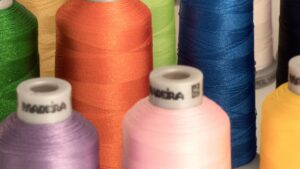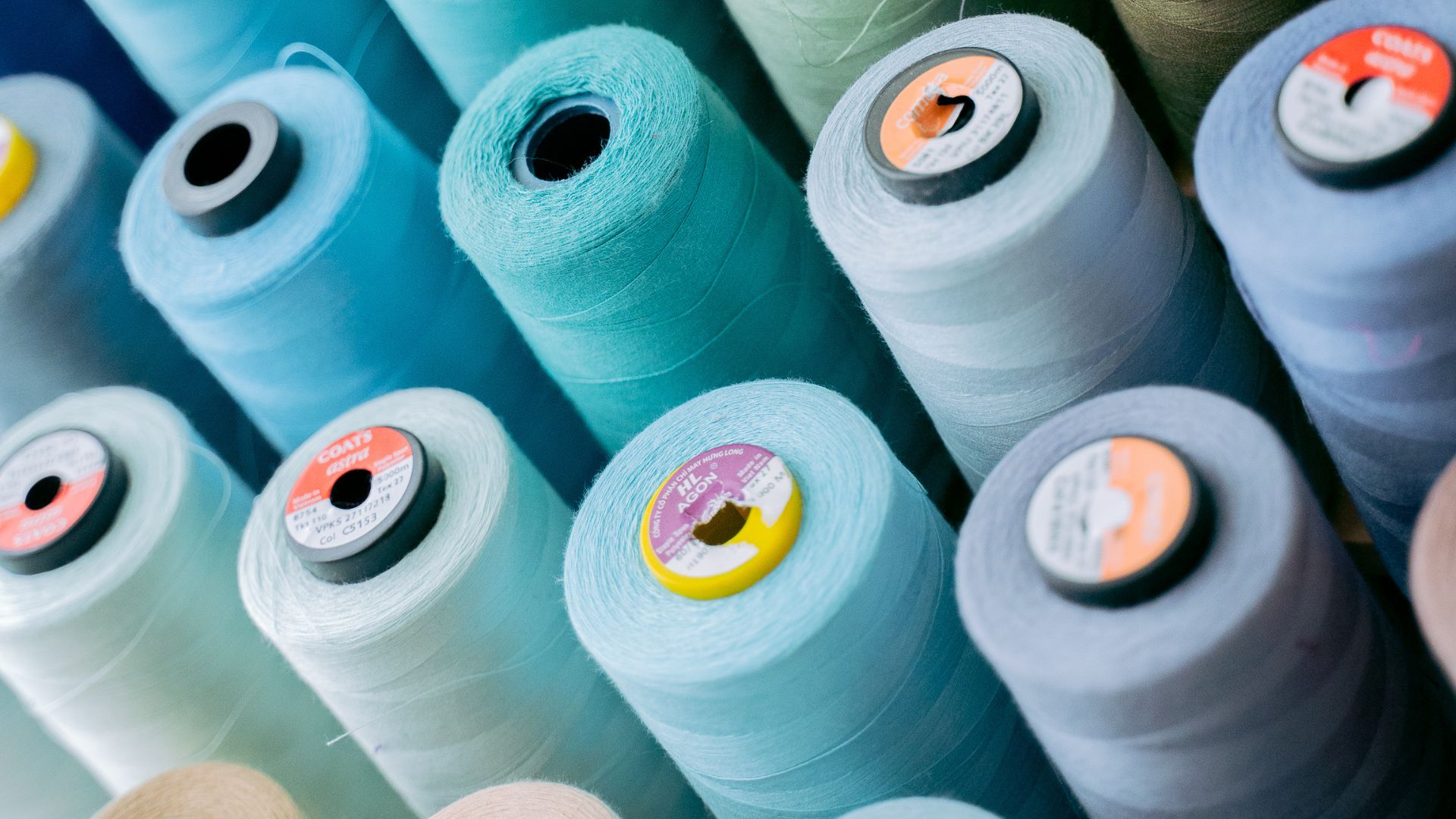Quilting, an artful blend of precision and creativity, is not just about the fabric; the thread you use can make all the difference in your final masterpiece. Selecting the right thread involves considering various factors, from the type of quilt to personal preferences. Let’s dive into the world of quilting threads to help you choose the perfect one for your project.
Understanding Thread Weight and Fiber Content
Thread Weight:
Thread weight determines its thickness. The standard measurement is represented by a number: the higher the number, the finer the thread. For quilting, threads typically range from 30 to 100 weight. A 50 or 40 weight is commonly used for piecing and quilting.
Fiber Content:
- Cotton: Known for its strength and versatility, cotton thread is an ideal choice for quilting. It works well with cotton fabrics and provides a traditional aesthetic.
- Polyester: Polyester threads offer durability and colorfastness, making them a popular choice for machine quilting.
- Silk: Silk threads lend a luxurious finish and glide smoothly through fabrics, but they are generally more expensive.

Factors Influencing Thread Selection
Quilt Purpose:
Consider the quilt’s intended use. For decorative quilts, you might prefer a finer thread for intricate detailing. For quilts intended for everyday use, a sturdy and durable thread could be more suitable.
Machine vs. Hand Quilting:
Different threads perform differently based on the quilting method. Machine quilting often benefits from polyester threads due to their strength and reduced lint, while hand quilting might require a smoother thread like silk.
Color and Aesthetics:
Thread color can either blend with the fabric or stand out to create contrast. Matching the thread to the fabric color is a classic choice, but contrasting colors can add depth and visual interest to your quilting design.
Top Picks for Quilting Threads
- Aurifil Cotton Thread (50wt): Renowned for its strength and minimal lint, this thread is versatile for both piecing and quilting.
- Gutermann Polyester Thread (40wt): Ideal for machine quilting, Gutermann offers a range of vibrant colors and excellent durability.
- YLI Silk Thread (100wt): Perfect for delicate hand quilting, this silk thread provides a luxurious finish and superb stitch definition.
So,…
Choosing the best thread for quilting is a personal decision influenced by various factors like fabric, quilting technique, and intended use. Experimentation with different threads on small projects can help you find the perfect match for your quilting endeavors. Remember, there’s no one-size-fits-all approach; it’s about finding what works best for you and your creative vision.
By considering thread weight, fiber content, and your unique preferences, you’ll stitch together a quilt that not only tells a story but also stands the test of time.
For further exploration on quilting threads, here are some additional resources:
Exploring Quilting Threads: Answering Common Questions
1. What’s the Difference Between Cotton and Polyester Threads for Quilting?
Cotton Threads:
- Strength & Versatility: Cotton threads are known for their strength, making them a great choice for quilting, particularly when working with cotton fabrics.
- Aesthetic Appeal: They provide a traditional look and are less likely to cause puckering due to their natural fibers.
Polyester Threads:
- Durability: Polyester threads offer exceptional durability and are less prone to breakage compared to cotton threads.
- Colorfastness: They retain color vibrancy even after multiple washes, making them suitable for quilts intended for frequent use.
2. Can I Mix Different Thread Types in One Quilt?
Absolutely! Mixing thread types can add dimension and visual interest to your quilt. Consider using cotton threads for piecing and a polyester thread for quilting to combine their respective strengths.
3. What Thread Weight Should I Use for Quilting?
- Piecing: A 50 or 40 weight thread is commonly used for piecing due to its strength and visibility.
- Quilting: Thicker threads like 40 or 30 weight work well for quilting as they create defined stitches that stand out.
4. Should I Match the Thread Color to the Fabric?
Matching thread color to the fabric is a classic choice and creates a cohesive look. However, using contrasting colors can highlight your quilting design and add visual interest.
5. How Can I Prevent Thread Breakage During Quilting?
- Use Quality Thread: Opt for high-quality threads to minimize breakage.
- Check Tension: Adjust the tension on your machine to suit the thread weight and fabric.
- Regular Maintenance: Keep your machine clean and well-maintained to avoid lint build-up, which can cause thread breakage.
6. Is Hand Quilting Better with Certain Threads?
Silk threads are often preferred for hand quilting due to their smoothness and ease of use. However, personal preference plays a significant role, and some quilters may prefer cotton or polyester threads for hand quilting.
Conclusion
Choosing the right quilting thread involves considering factors like thread weight, fiber content, and intended use. Experimenting with different threads on small projects can help you discover the best match for your quilting endeavors.
Whether you opt for the strength of cotton, the durability of polyester, or the luxury of silk, your choice of thread can elevate your quilting project, turning it into a cherished work of art.
Remember, there’s no right or wrong answer when it comes to selecting threads for quilting; it’s all about finding what works best for you and your unique quilting style.
Comparison tabular
Quilting Thread Comparison Table
| Aspect | Cotton Thread | Polyester Thread | Silk Thread |
|---|---|---|---|
| Fiber Content | Made from natural cotton fibers | Made from synthetic polyester fibers | Made from silk fibers |
| Strength | Strong and durable, ideal for everyday use | Very strong and durable, suitable for frequent washing | Strong, offering a luxurious finish |
| Thread Weight | Commonly available in 40 or 50 weight | Available in various weights, often used in 40 weight for quilting | Generally available in finer weights like 100wt |
| Suitability | Well-suited for cotton fabrics, provides a traditional look | Versatile, suitable for most fabrics, great for machine quilting | Offers a luxurious finish, perfect for delicate work |
| Colorfastness | Colors may fade over time with repeated washing | Highly colorfast, retains vibrancy even after multiple washes | Generally colorfast, but may require gentle washing |
| Cost | Moderately priced, widely available | Affordable and readily available | More expensive compared to cotton and polyester threads |
| Quilting Type | Suitable for both hand and machine quilting | Excellent for machine quilting, can also be used for hand quilting | Ideal for delicate hand quilting projects |
This table highlights the key differences between cotton, polyester, and silk threads commonly used in quilting. Understanding these distinctions can assist in making an informed decision based on your quilting project’s specific needs and preferences.
Wrapping up
As you venture into the world of quilting, the choice of thread becomes an artful decision, shaping not just the stitches but the story your quilt tells.
Cotton threads offer tradition and strength, polyester threads bring durability and vibrancy, while silk threads exude luxury and finesse. Each has its charm, suited for various quilting styles, techniques, and preferences.
Remember, the perfect thread is the one that complements your creative vision, stitching together a masterpiece that reflects your passion and dedication to the craft.
So, whether you’re piecing together memories, crafting heirlooms, or exploring your artistic flair, let the thread be your guide as you weave together quilts that not only warm the body but also the heart.
Happy Quilting, Stitching, and Creating.
If you have any more queries or need further guidance, don’t hesitate to reach out.

For over a decade, I’ve been Mike, an artist, crafter, and designer deeply immersed in the Croc world. I thrive on crafting unique, size-inclusive patterns, fostering creativity, and sharing them on ktforum.com. My designs aim to ignite your creative spark and delight you, ensuring clarity and ease of use through rigorous testing. Join me in expressing your creative flair and showcasing your craft with joy.
Related Posts
- Quilting with Flannel Fabric: Your Comprehensive Guide
Quilting is a beautiful craft that allows you to create cozy, functional, and artistic pieces.…
- Essential Tools for Quilting: Your Comprehensive Guide
Quilting is a cherished art form that weaves together creativity and skill. Whether you're a…
- Quilting Without Templates: A Guide to Free-Form Quilting
Quilting is a delightful craft that allows you to weave together fabric, creativity, and skill…
- Creating Even Stitches in Your Quilt: A Comprehensive Guide
Quilting is an art form that involves precision, creativity, and attention to detail. One crucial…

